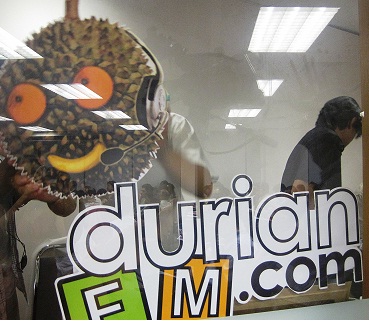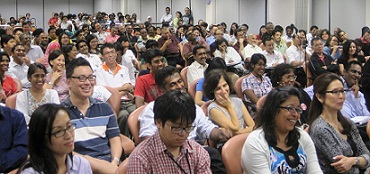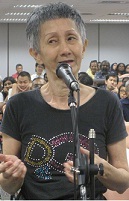PSM's Choo Chon Kai shares his thoughts and feelings
when he was detained under the Emergency Ordinance and placed under
solitary confinement.
EXCLUSIVE - FMT

PETALING
JAYA: He was kept in solitary confinement for 34 days, every detail of
his life was brushed with a finetooth comb and he had to endure hours of
daily interrogation.
But Emergency Ordinance (EO) detainee Choo Chon Kai has not been
cowed by his ordeal. Instead, it has strengthened his resolve to be a
more dedicated social activist.
The forced isolation has also brought out the humourous side of the
33-year-old Parti Sosialis Malaysia (PSM) central committee member.
“They were asking me so many details of my life, perhaps they want to help me write my autobiography,” he said.
Choo said he used his days and hours of solitude as a retreat and to
reflect on life. He even said that he looked forward to meet his
Special Branch interrogators.
“There were times, at night, when the loneliness was unbearable
because there’s not a single person to talk to. When I meet my
interrogators in the morning, I was then able to assure myself of
reality, that I’m still alive and conscious and not crazy,” he said.
Choo was among the six PSM members who were re-arrested and detained
under the Emergency Ordinance 1969 without trial when their 24 comrades
were released on July 2.
All 30 of them were first arrested in Penang on June 25 on suspicion
of “waging war against the King”. The police had justified the EO
detention by saying the six were involved in “foreign elements” and “had
subversive tendencies”.
The six EO detainees were released last Friday after languishing in
solitary confinement for 34 days – six days in police remand when
first arrested, followed by 28 days under the EO.
“They gave me everything, except my freedom,” said Choo when asked to
summarise his experience. He said the cops were actually quite soft in
their approach, adding that the police on the street should be more
polite like that.
War against the King?
Initially he was worried when accused of “waging war against the King”.
“I was shocked when told of the first charge under Section 122. Then
when they used the Emergency Ordinance, I told myself ‘Okay, so they’re
finally using the EO now’.
“Then after thinking to myself about how they don’t have anything
against us, I relaxed and kept calm all the time, I didn’t fight back.
Just cooperate, I thought,” he said.
Choo said he mentally prepared himself for the worst case scenario:
two years in Kamunting; so he was pleasantly surprised when he was
released last week.
Choo was first held in Penang in a small confined cell which he
described as “very warm” and said the rooms during EO detention were
actually slightly better.
He said during the detention in Penang, he was questioned by three or
four officers from the special branch division as well as the criminal
investigation department.
“They kept asking about Bersih: are we going, how are we campaigning,
what was our plan, and why were there communism t-shirts. But we were
not really the Bersih organisers, they got the wrong people,” he said.
Choo said he had nothing to hide and even told the police that he
fully supported Bersih and would be there if he wasn’t detained.
“They just kept saying ‘Bersih is a threat to public order we cannot let people get in’,” he said.
Choo said there was drama when they were released and re-arrested on
July 2 by plainclothes policemen but all he was worried about was the
Bersih rally.
“At that time, when they used the EO, I worried it was going to be a
major crackdown on Bersih rally supporters and leaders. I was worried
that it (Bersih rally) won’t happen. But before I was re-arrested, I
managed to tell my friends who saw me that they have to be there,” he
said.
Choo said that he believed the police were simply using all sorts of
“scare tactics” but these tactics didn’t work on the PSM EO6, as they
are now known.
“We are not wrong. If you say that we are against BN government means
we’re against the King…then that’s an insult against the King,” he
said.
Choo, who only got to meet his detained PSM colleagues when they
changed clothes or were brought out blindfolded, said the EO detention
was much better than the police detention in Penang as they had soap and
toothbrushes and two sets of lock-up clothes
“During the first detention, I didn’t brush my teeth for a week!” he said.
Choo said a normal lunch consisted of rice with fried fish, curry
chicken and vegetables. On the types of questions they asked , Choo said
it covered almost every minute detail of his life.
“At first it was very tense questioning. There was a team of
interrogators, four of them, and they asked me about my involvement in
my university days, my involvement in Suaram and PSM ideologies. At that
point, they asked very little about Bersih,” said Choo.
Choo, who was born and raised in Penang, is a Universiti Sains
Malaysia chemical science graduate and has been in student activism
since his university days.
A one-semester suspension from studies when he was found wearing and
selling anti-ISA badges in 2001 spurred him to further his activism
instead of deterring him from politics.
The former Suaram Penang coordinator is also involved in helping
local communities, especially plantation workers. He joined PSM in 2005
and worked for Dr Michael D Jeyakumar as his assistant in 2008.
Cold War mentality

Choo’s
father passed away 13 years ago and his mother is retired but earns
pocket money by doing odd jobs at a factory. His younger brother is a
storekeeper in a factory.
During detention, Choo said that interrogators tried to change his ideologies but it hardly worked.
“Basically they said our actions bring disturbances to the
country.They repeatedly advised me ‘You get so little here doing
politics, why don’t you find a better life, get married?’” said Choo.
Choo also said the police had tried to ‘divide and conquer’ them by
telling another detainee that Choo himself was untrustworthy.
“They say all sorts of things just to cause distrust among detainees.
I think they used such tactics to get information,” he said.
Choo was also asked why he, as a Chinese, would want to join PSM.
“I joined them because I see good work done by the PSM and my race
never mattered. I was really moved by their work with plantation workers
and my reward, although not big, was the satisfaction of changing
people’s lives that is better than money,” he said.
The focus of questionings also brought police to Choo’s overseas
trips. They asked if he had ever been to the Southern Thailand to meet
ex-communists.
“But I only went to Bangkok for a holiday,” he said.
Southern Thailand is now home to former leaders of the Communist
Party of Malaya who gave up their struggle after inking a peace pact
with the Malaysian government in 1989.
The police had seized T-shirts depicting ex-communist leaders and had accused PSM of seeking to revive communism.
Choo said interrogations during EO detention was on average six hours
a day, from 10am after breakfast into the afternoon. After 2pm lunch,
it would stretch up to 6pm and then detainees are allowed some free
time.
Choo said the results of his daily questionings resulted in a 60-page “book” of his life.
He also said that he wasn’t allowed to bring even a pen or paper into
his 2×2.5 metre cell. There were also two beds and a wooden floor board
and a tiny box as a toilet.
“I don’t hate the police, there are good men out there. It’s the
problem with the leadership, they still live in colonial era… with all
these allegations of the threat of communism… it’s very Cold War
mentality and too simplistic,” he said.
Choo, who is described by a friend as ”old fashioned and soft-spoken”
but also “sincere and progressive” activist, said his detention has
merely strengthened his resolve to continue his political career as he
now has more “hope for advancing democracy and social justice”.


 "I think the list of PR names in the NRD's website was the old one and not updated," said EC chairperson Abdul Aziz Yusof (left) in a text-message to Malaysiakini late last night.
"I think the list of PR names in the NRD's website was the old one and not updated," said EC chairperson Abdul Aziz Yusof (left) in a text-message to Malaysiakini late last night. "The voters of that area can object (if they find any irregularity)," he added.
"The voters of that area can object (if they find any irregularity)," he added. The
names of all newly-registered voters, voters who have changed their
residential addresses and voters who have been removed from the
electoral roll, make up the list in the draft supplementary electoral
roll.
The
names of all newly-registered voters, voters who have changed their
residential addresses and voters who have been removed from the
electoral roll, make up the list in the draft supplementary electoral
roll. Hedzer then instructed the party technician to check the NRD online system again and obtained the same surprising result.
Hedzer then instructed the party technician to check the NRD online system again and obtained the same surprising result. During
the display period, members of the public can raise their objection to
the names listed in the supplementary electoral roll.
During
the display period, members of the public can raise their objection to
the names listed in the supplementary electoral roll.






 SHAH ALAM, 2 Ogos:
Pakatan Rakyat yakin kos sara hidup tinggi yang terpaksa ditanggung
oleh setiap rakyat negara ini pada hari ini adalah akibat dasar-dasar
Kerajaan Barisan Nasional yang mewujudkan sistem monopoli dan
ketinggalan zaman.
SHAH ALAM, 2 Ogos:
Pakatan Rakyat yakin kos sara hidup tinggi yang terpaksa ditanggung
oleh setiap rakyat negara ini pada hari ini adalah akibat dasar-dasar
Kerajaan Barisan Nasional yang mewujudkan sistem monopoli dan
ketinggalan zaman.




